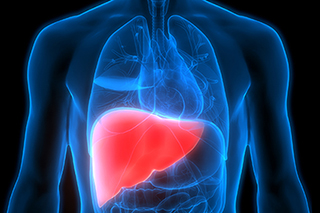August 13, 2019

University of Cincinnati (UC) researchers discovered that an enzyme involved in repairing damaged DNA also reduced the development of liver tumors in mice. Study results may help scientists develop new ways to treat liver cancer, the fourth leading cause of cancer deaths worldwide.
The study was led by UC Center for Environmental Genetics (CEG) researchers Chunying Du, Ph.D., and Liang Niu, Ph.D.
Previous research conducted in Du’s lab showed that an enzyme, called BIR Repeat-containing Ubiquitin-Conjugating Enzyme (BRUCE), activates pathways that stimulate the repair of damaged DNA. To further study the role of BRUCE in DNA repair and cancer, her lab developed a mouse model in which the mice lack the BRUCE enzyme in their livers, called BRUCE liver knockout (LKO) mice.
Using this mouse model, the researchers examined the role of BRUCE in liver stress and tumor formation caused by a DNA-damaging drug, diethylnitrosamine (DEN). When normal young mice were treated with DEN, they developed liver tumors similar to human liver tumors. When BRUCE LKO mice were treated with DEN, the mice developed more and larger liver tumors than normal mice. The LKO mice livers also had more inflammation and fibrosis, a type of tissue damage.
The researchers concluded that BRUCE plays a role in preventing or reducing DNA damage in the liver, which helps limit tumor growth after DEN treatment. They also discovered that BRUCE may play a role in slowing down or reducing other liver diseases including hepatitis and cirrhosis.
Du and Niu continue to study the role of BRUCE in DNA damage and liver cancer with a long-term goal of finding new ways to treat human liver cancer.
Du is a new member of the CEG and an associate professor of cancer and cell biology at UC. Niu is funded through CEG as a new investigator and is an assistant professor in the Bioinformatics Core.
This work was supported in part by the National Institute of Environmental Health Sciences (P30ES006096) and the National Cancer Institute (R01CA158323 to C. Du).


